高级商务英语听说(大纲+教案+课件+试卷)江春
- 格式:pdf
- 大小:3.82 MB
- 文档页数:6
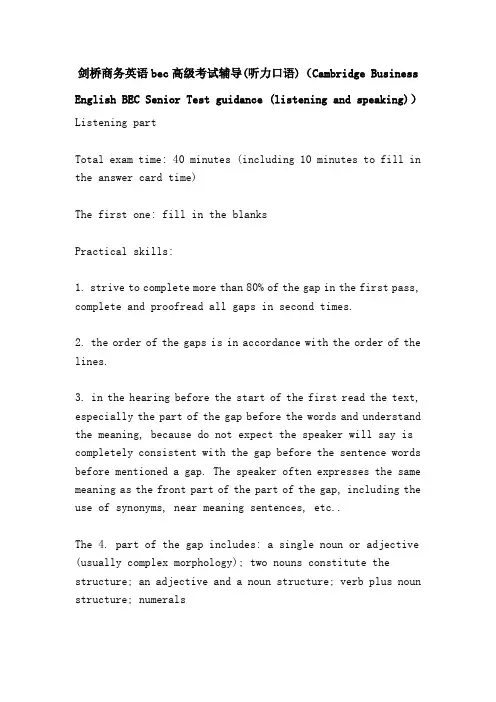
剑桥商务英语bec高级考试辅导(听力口语)(Cambridge Business English BEC Senior Test guidance (listening and speaking))Listening partTotal exam time: 40 minutes (including 10 minutes to fill in the answer card time)The first one: fill in the blanksPractical skills:1. strive to complete more than 80% of the gap in the first pass, complete and proofread all gaps in second times.2. the order of the gaps is in accordance with the order of the lines.3. in the hearing before the start of the first read the text, especially the part of the gap before the words and understand the meaning, because do not expect the speaker will say is completely consistent with the gap before the sentence words before mentioned a gap. The speaker often expresses the same meaning as the front part of the part of the gap, including the use of synonyms, near meaning sentences, etc..The 4. part of the gap includes: a single noun or adjective (usually complex morphology); two nouns constitute the structure; an adjective and a noun structure; verb plus noun structure; numeralsThe 5. gap is the noun (or noun structure) of the sign: the emergence of prepositions before the gap.The 6. gap is the mark of adjectives: there are nouns after the gap.The 7. gap is the sign of the verb (or verb structure): there is a preposition after the gap.The 8. gap is the sign of numeral (or numeral structure): the emergence of number, percentage and other prompt words before and after the gap.9. when the word (or structure) is too long at the gap, you can take shorthand at the first time, and finish it second times.10. when you really grasp the Chinese meaning of the word in the gap, but can not think of English, you can use synonyms instead.Second: the number of matching (to make thousands of candidates in the examination room, hardly wished to live.!!)Practical skills:1. grasp the Chinese meaning of each option, and imagine the words that the speaker may use whenever the choice is expressed or described.2., if you hear the content of the article is consistent with an option, generally bold to exclude this option.3. the expression in the correct option is synonymous with some part of the text. (part of the content or just a word or phrase; or a sentence)4. pay attention to the speaker's tone. (this method is especially applicable to the judgment of speaker's attitudes)5. candidates usually need to know more about the language use of various commercial occasions.The third item: multiple choicePractical skills:1. all questions are asked according to the order of the text.2. for each problem, the speaker has a clear and prompt exposition, so the key to solving problems is to find and understand these tips.The use of 3. suggestive words. The prompt words used by general speakers are: but; but I think; real... Fact is that... ;... Not the case; it is... Which/that... ;4. some words are synonymous with the words in the answer.5. let the reader infer the answer by giving an example.6. put the answer ahead of the examples.7., the speaker's confusion of the listener includes:(1) put forward some so-called reasons at the beginning, and put the real reason at the end.(2) the speaker will listen to some "prompt" at a quicker rate, usually some phrasal phrases, to confuse listeners. The words in the "prompt" often appear directly in the options.8., combined with the above points, it is not difficult to find the correct answer in this item are indirect given, usually through the speaker's 2 to 3 steps.Oral partThe whole exam time is about 16 minutes.The first one: ask for personal informationThe exam time: about 3 minutes.The form of the examination: the examiner puts questions to the examinee one by one, and the examinee answers.This examination content: involves many aspects of personal information, examiner questioning is ever-changing, but must design some aspects of personal information. Usually, in order to check the qualification of candidates,考官会问以下问题:你叫什么名字?/你能拼一下你的姓吗?/你能拼一下你的姓吗?/你的电话号码是多少?回答范例:我的名字是瑞。
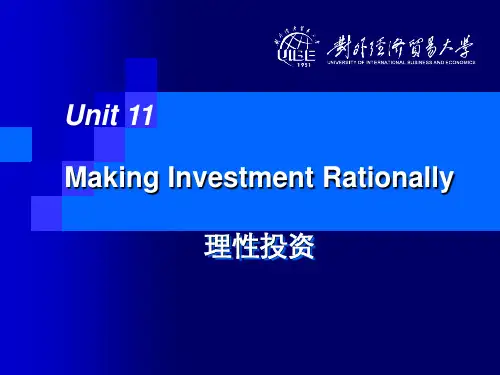
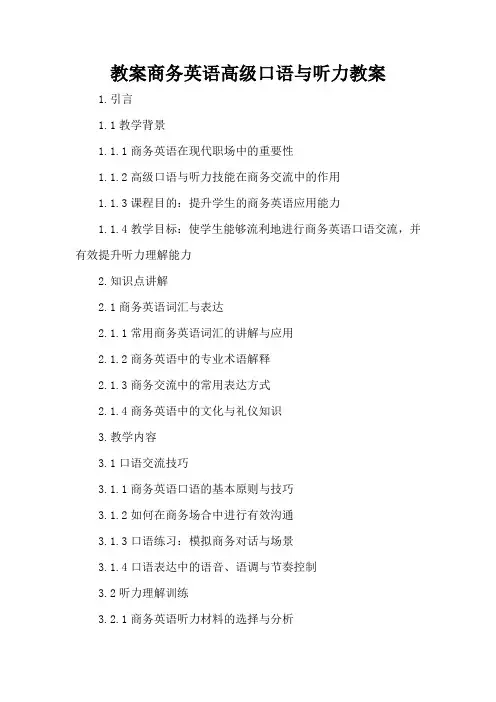
教案商务英语高级口语与听力教案1.引言1.1教学背景1.1.1商务英语在现代职场中的重要性1.1.2高级口语与听力技能在商务交流中的作用1.1.3课程目的:提升学生的商务英语应用能力1.1.4教学目标:使学生能够流利地进行商务英语口语交流,并有效提升听力理解能力2.知识点讲解2.1商务英语词汇与表达2.1.1常用商务英语词汇的讲解与应用2.1.2商务英语中的专业术语解释2.1.3商务交流中的常用表达方式2.1.4商务英语中的文化与礼仪知识3.教学内容3.1口语交流技巧3.1.1商务英语口语的基本原则与技巧3.1.2如何在商务场合中进行有效沟通3.1.3口语练习:模拟商务对话与场景3.1.4口语表达中的语音、语调与节奏控制3.2听力理解训练3.2.1商务英语听力材料的选择与分析3.2.2提升听力理解的策略与技巧3.2.3听力练习:商务英语对话与演讲3.2.4听力理解中的关键词汇与语境推断3.3综合技能实践3.3.1结合口语与听力技能的商务场景模拟3.3.2商务英语会议、谈判与演讲的实践3.3.3角色扮演与小组讨论3.3.4综合技能评估与反馈4.教学目标4.1提升商务英语应用能力4.1.1学生能够流利地使用商务英语进行日常交流4.1.2学生能够理解并运用商务英语中的专业术语和表达4.1.3学生能够在不同的商务场合中恰当运用英语4.1.4学生能够通过听力材料理解商务英语的语境和细节4.2增强跨文化交际能力4.2.1学生能够了解并尊重不同文化背景下的商务交流习惯4.2.2学生能够适应国际商务环境中的文化差异4.2.3学生能够在跨文化商务交流中避免误解和冲突4.2.4学生能够运用恰当的商务礼仪增强交流效果4.3培养批判性思维与问题解决能力4.3.1学生能够分析商务交流中的信息并进行批判性思考4.3.2学生能够通过听力材料识别关键信息和论点4.3.3学生能够运用英语进行有效的商务谈判和解决问题4.3.4学生能够通过小组讨论和角色扮演提升团队协作能力5.教学难点与重点5.1商务英语词汇与表达的准确运用5.1.1难点:商务英语中的专业术语和复杂表达5.1.2重点:词汇的实际应用场景和语境理解5.1.3难点:正确使用商务英语进行口语交流5.1.4重点:听力材料中的商务语境和文化背景理解5.2商务英语口语交流技巧5.2.1难点:语音、语调的正确运用5.2.2重点:有效沟通和表达技巧的培养5.2.3难点:在商务场合中的自信表达5.2.4重点:口语交流中的非语言沟通技巧5.3商务英语听力理解能力5.3.1难点:快速捕捉关键信息和细节5.3.2重点:听力材料中的语境和文化背景理解5.3.3难点:听力材料中的专业术语和表达5.3.4重点:提升听力理解的速度和准确性6.教具与学具准备6.1教学资源6.1.1商务英语教材和听力材料6.1.2商务英语口语练习场景和案例6.1.3多媒体设备(如投影仪、音响等)6.1.4网络资源(如在线商务英语课程、听力练习等)6.2学生活动材料6.2.1口语练习场景和角色扮演指南6.2.2听力练习题和答案6.2.3商务英语词汇表和表达手册6.2.4小组讨论和角色扮演的评估表6.3教学辅助工具6.3.1教学白板和彩色笔6.3.2口语和听力练习的音频和视频材料6.3.3商务英语交流的模拟软件和应用程序6.3.4教学反馈和评估工具(如调查问卷、测试题等)7.教学过程7.1导入与热身7.1.1引入商务英语口语与听力的主题7.1.2进行简短的口语练习和听力热身活动7.1.3分享相关的商务英语案例和背景知识7.1.4引导学生思考和讨论商务交流中的挑战和技巧7.2知识点讲解与练习7.2.1讲解商务英语词汇和表达7.2.2进行口语和听力练习,强化知识点7.2.3分组讨论和角色扮演,提升实际应用能力7.2.4提供反馈和指导,帮助学生改进口语和听力技巧7.3综合技能实践与评估7.3.1进行商务英语口语和听力的综合练习7.3.2小组合作完成商务场景模拟和角色扮演7.3.3进行学生自评和互评,提升自我反思能力8.板书设计8.1教学内容概览8.1.1课程主题:商务英语高级口语与听力8.1.2教学目标:提升商务英语应用能力、跨文化交际能力和批判性思维8.1.3教学重点:商务英语词汇与表达、口语交流技巧和听力理解能力8.1.4教学难点:专业术语的运用、口语表达的自然流畅和听力材料中的细节捕捉8.2知识点详解8.2.1商务英语词汇与表达:专业术语、常用表达和语境应用8.2.2口语交流技巧:语音、语调、非语言沟通和有效表达8.2.3听力理解能力:关键信息捕捉、语境理解和文化背景知识8.3练习与活动安排8.3.1口语练习:模拟商务对话、角色扮演和小组讨论8.3.2听力练习:听力材料理解、关键信息和细节捕捉8.3.3综合练习:商务场景模拟、跨文化交际和问题解决9.作业设计9.1口语练习作业9.1.1录制一段商务英语口语对话或演讲9.1.2分析并改进自己的语音、语调和表达技巧9.1.3分享录音和反思,接受同学和老师的反馈9.2听力练习作业9.2.1完成指定的商务英语听力材料9.2.3分享听力理解和学习心得,进行讨论和交流9.3综合技能作业9.3.1准备一个商务英语话题进行小组讨论或角色扮演9.3.2分析跨文化交际中的挑战和解决方案9.3.3提交小组讨论记录或角色扮演视频,接受评估和反馈10.课后反思及拓展延伸10.1教学效果评估10.1.1学生参与度和互动情况10.1.2学生口语和听力能力的提升程度10.1.3学生对教学内容的理解和应用能力10.1.4学生跨文化交际和问题解决能力的展示10.2教学改进与拓展10.2.1针对学生的反馈和表现,调整教学方法和内容10.2.2引入更多实际商务场景和案例分析,提升学生的应用能力10.2.3提供更多的口语和听力练习资源,鼓励学生自主学习和实践10.2.4组织商务英语讲座或交流活动,拓宽学生的视野和经验重点关注环节的补充和说明:教学难点与重点:商务英语词汇与表达的准确运用、口语交流技巧和听力理解能力是教学的重点和难点。
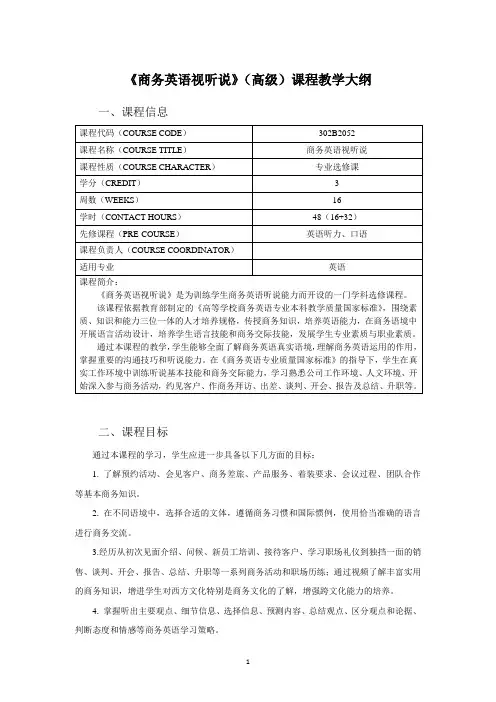
《商务英语视听说》(高级)课程教学大纲
一、课程信息
二、课程目标
通过本课程的学习,学生应进一步具备以下几方面的目标:
1. 了解预约活动、会见客户、商务差旅、产品服务、着装要求、会议过程、团队合作等基本商务知识。
2. 在不同语境中,选择合适的文体,遵循商务习惯和国际惯例,使用恰当准确的语言进行商务交流。
3.经历从初次见面介绍、问候、新员工培训、接待客户、学习职场礼仪到独挡一面的销售、谈判、开会、报告、总结、升职等一系列商务活动和职场历练;通过视频了解丰富实用的商务知识,增进学生对西方文化特别是商务文化的了解,增强跨文化能力的培养。
4. 掌握听出主要观点、细节信息、选择信息、预测内容、总结观点、区分观点和论据、判断态度和情感等商务英语学习策略。
5.树立正确的价值观,具有从事商务英语交流的愿望和兴趣,形成团结协作、遵守约定、求同存异、合作共赢的理念。
课程目标对毕业要求的支撑关系表
三、教学内容与预期学习成效
4
5
6
四、成绩评定及考核方式
五、课程建议教材及主要参考资料
1. 建议教材
姜荷梅. 《商务英语视听说教程4学生用书》(第二版). 上海:上海外语教育出版社,2017.6
2. 主要参考资料
1)姜荷梅. 《商务英语视听说教程4教师用书》(第二版). 上海:上海外语教育出版社,2017.6
2)马龙海. 《商务英语视听说》.北京:外语教育与研究出版社,2009.7。
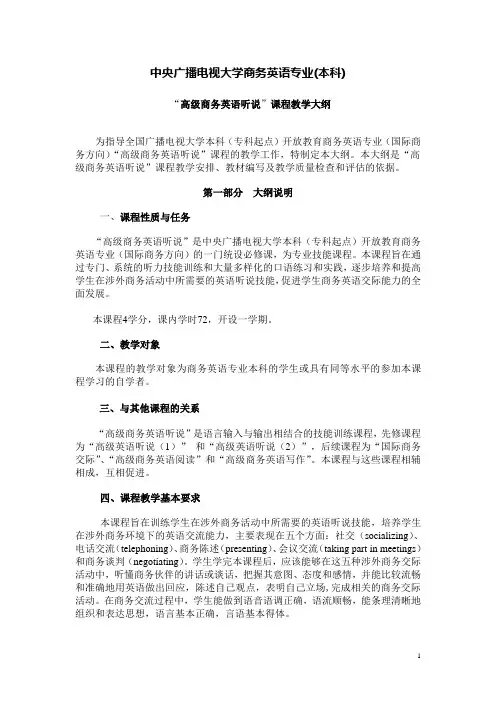
中央广播电视大学商务英语专业(本科)“高级商务英语听说”课程教学大纲为指导全国广播电视大学本科(专科起点)开放教育商务英语专业(国际商务方向)“高级商务英语听说”课程的教学工作,特制定本大纲。
本大纲是“高级商务英语听说”课程教学安排、教材编写及教学质量检查和评估的依据。
第一部分大纲说明一、课程性质与任务“高级商务英语听说”是中央广播电视大学本科(专科起点)开放教育商务英语专业(国际商务方向)的一门统设必修课,为专业技能课程。
本课程旨在通过专门、系统的听力技能训练和大量多样化的口语练习和实践,逐步培养和提高学生在涉外商务活动中所需要的英语听说技能,促进学生商务英语交际能力的全面发展。
本课程4学分,课内学时72,开设一学期。
二、教学对象本课程的教学对象为商务英语专业本科的学生或具有同等水平的参加本课程学习的自学者。
三、与其他课程的关系“高级商务英语听说”是语言输入与输出相结合的技能训练课程,先修课程为“高级英语听说(1)”和“高级英语听说(2)”,后续课程为“国际商务交际”、“高级商务英语阅读”和“高级商务英语写作”。
本课程与这些课程相辅相成,互相促进。
四、课程教学基本要求本课程旨在训练学生在涉外商务活动中所需要的英语听说技能,培养学生在涉外商务环境下的英语交流能力,主要表现在五个方面:社交(socializing)、电话交流(telephoning)、商务陈述(presenting)、会议交流(taking part in meetings)和商务谈判(negotiating)。
学生学完本课程后,应该能够在这五种涉外商务交际活动中,听懂商务伙伴的讲话或谈话,把握其意图、态度和感情,并能比较流畅和准确地用英语做出回应,陈述自己观点,表明自己立场,完成相关的商务交际活动。
在商务交流过程中,学生能做到语音语调正确,语流顺畅,能条理清晰地组织和表达思想,语言基本正确,言语基本得体。
第二部分媒体使用和教学过程建议一、课程的基本结构及学时分配“高级商务英语听说”开设一学期(18周),课内学时为72学时,每周4学时。

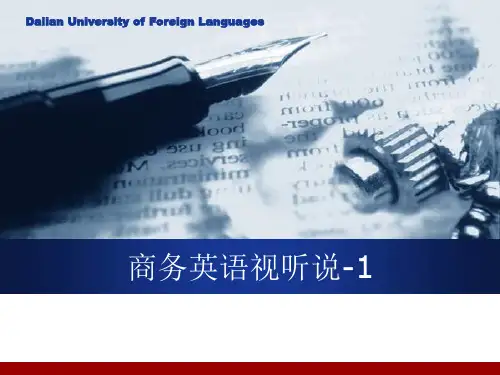
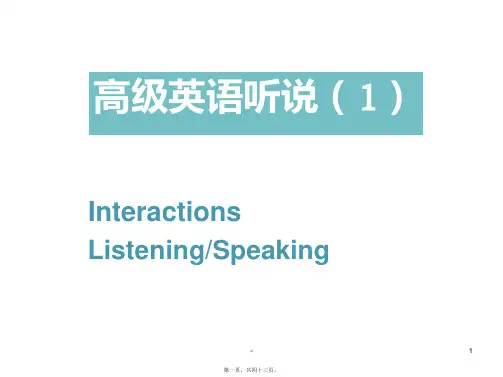
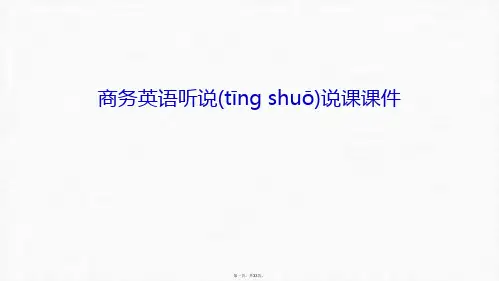
![高级商务英语听说(第二版)Unit 15 Organizational Culture -Competitive Advantage[精]](https://uimg.taocdn.com/8bb15ee06529647d26285220.webp)

矿产资源开发利用方案编写内容要求及审查大纲
矿产资源开发利用方案编写内容要求及《矿产资源开发利用方案》审查大纲一、概述
㈠矿区位置、隶属关系和企业性质。
如为改扩建矿山, 应说明矿山现状、
特点及存在的主要问题。
㈡编制依据
(1简述项目前期工作进展情况及与有关方面对项目的意向性协议情况。
(2 列出开发利用方案编制所依据的主要基础性资料的名称。
如经储量管理部门认定的矿区地质勘探报告、选矿试验报告、加工利用试验报告、工程地质初评资料、矿区水文资料和供水资料等。
对改、扩建矿山应有生产实际资料, 如矿山总平面现状图、矿床开拓系统图、采场现状图和主要采选设备清单等。
二、矿产品需求现状和预测
㈠该矿产在国内需求情况和市场供应情况
1、矿产品现状及加工利用趋向。
2、国内近、远期的需求量及主要销向预测。
㈡产品价格分析
1、国内矿产品价格现状。
2、矿产品价格稳定性及变化趋势。
三、矿产资源概况
㈠矿区总体概况
1、矿区总体规划情况。
2、矿区矿产资源概况。
3、该设计与矿区总体开发的关系。
㈡该设计项目的资源概况
1、矿床地质及构造特征。
2、矿床开采技术条件及水文地质条件。